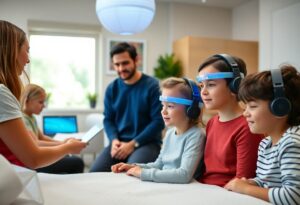Most individuals seeking relief for Oppositional Defiant Disorder (ODD) often wonder about alternative therapies that could complement traditional treatments. Two promising options gaining attention are Transcranial Magnetic Stimulation (TMS) and neurofeedback. In this article, you will explore how these innovative approaches work, their potential benefits, and the scientific evidence supporting their use for managing symptoms of ODD. By understanding these therapies, you can make informed decisions about your treatment options and pave the way for a more positive outcome.

Key Takeaways:
-
- TMS may offer a non-invasive treatment option for ODD by targeting specific brain areas associated with behavior regulation.
- Neurofeedback can help improve self-control and emotional regulation, potentially reducing symptoms of ODD through behavioral training.
TMS and
Neurofeedback
- are still under research, and individual responses can vary; consulting with a healthcare professional is crucial before starting treatment.
Understanding Oppositional Defiant Disorder (ODD)
To effectively address Oppositional Defiant Disorder (ODD), it’s crucial to understand what it entails and how it manifests in children’s behavior. This disorder can profoundly affect the child’s daily functioning and relationships.
Definition of ODD
Below, you will find that Oppositional Defiant Disorder is a behavioral condition characterized by a consistent pattern of angry, irritable moods, argumentative behavior, and defiance toward authority figures, which can significantly disrupt social and academic development.
Symptoms and Diagnosis
Above all, identifying ODD requires recognizing its symptoms, which may include frequent temper outbursts, excessive arguing with adults, and actively refusing to comply with requests. Diagnosis typically involves a thorough assessment by a mental health professional to differentiate ODD from other behavioral disorders.
Diagnosis often includes gathering information from parents, teachers, and other caregivers to evaluate the child’s behavior across different settings. By fulfilling specific criteria outlined in the DSM-5, professionals can arrive at a comprehensive understanding of whether a child meets the diagnosis for ODD.
Prevalence and Risk Factors
Defiant behaviors associated with ODD occur in approximately 1-16% of children, influenced by a mix of genetic, environmental, and psychological factors. Some key risk factors include:
- Family history of mental health disorders
- Poverty or exposure to violence
- Trauma or adverse childhood experiences
Thou must understand that recognizing these risk factors can guide you in seeking appropriate interventions for affected children.
Disorder development may stem from a combination of biological predispositions and environmental stressors. Contributing factors often include the parenting style, familial relationships, and community dynamics, which can intensify ODD symptoms in vulnerable children.
- Poor parental supervision
- Inconsistent discipline
- Exposure to negative peer influences
Thou should consider these influences when evaluating a child’s behavior and seeking solutions for ODD.
Impact on Family and Social Relationships
Around families with a child diagnosed with ODD, significant stress can arise due to ongoing conflict and challenges managing the child’s behavior. This strain can affect everyone in the household, leading to feelings of frustration and helplessness.
Oppositional behavior can lead to strained relationships with parents, siblings, and peers, making it difficult for children with ODD to make friends or maintain social connections. Both parents and educators may struggle to implement effective strategies for intervention, further complicating the family dynamics and emotional well-being of all involved.
Traditional Treatment Approaches for ODD
The treatment of Oppositional Defiant Disorder (ODD) often involves a combination of methods tailored to meet the individual needs of your child. Understanding traditional approaches can provide a foundation for exploring additional options such as TMS and Neurofeedback.
Psychotherapy
Around the world of mental health, psychotherapy has become a cornerstone in treating ODD. This method helps your child explore their thoughts and feelings while developing better coping strategies and improving their ability to manage emotions.
Behavioral Interventions
Traditional approaches often include behavioral interventions designed to modify specific behaviors associated with ODD. This may involve reinforcement strategies that reward positive behaviors while discouraging oppositional conduct.
To effectively implement behavioral interventions, you may focus on consistent rewards for desirable behavior and clear consequences for negative actions. Techniques such as positive reinforcement, token economies, and structured routines can be beneficial for helping your child learn more appropriate ways to express their feelings and interact with others.
Medication Options
At times, medication options may be considered in the treatment of ODD, especially if your child has co-occurring conditions such as ADHD. Medications can assist in managing symptoms by targeting underlying issues that contribute to oppositional behavior.
Behavioral therapies can be more effective when used in conjunction with medication. Medications such as stimulants and mood stabilizers might help improve focus, reduce impulsivity, and address irritability, enabling your child to engage more effectively in therapeutic practices.
Family Therapy
After you have considered individual therapy for your child, family therapy can also play an important role in addressing ODD. This approach encourages open communication and fosters understanding within the family dynamic, helping all members work together to create a supportive environment.
Approaches in family therapy often focus on improving interactions between family members and equipping you with tools to help your child navigate their challenges. These sessions can strengthen family bonds and provide strategies for maintaining a harmonious home life, ultimately benefiting your child’s progress in overcoming ODD.
Just exploring treatment options for Oppositional Defiant Disorder (ODD) can feel overwhelming. As a parent or caregiver, you may be seeking effective methods to address the challenges associated with ODD, which often includes persistent anger, irritability, and defiance. Transcranial Magnetic Stimulation (TMS) and neurofeedback are two innovative techniques that have shown promise in improving behavioral issues. In this article, you will learn how these therapies work and whether they could be beneficial for you or your child dealing with ODD.
There’s growing interest in alternative treatments for Oppositional Defiant Disorder (ODD), particularly Transcranial Magnetic Stimulation (TMS) and neurofeedback. If you’re looking for effective solutions to manage ODD symptoms, exploring these therapies might be beneficial for you. TMS is a non-invasive procedure that targets specific brain areas, while Neurofeedback Therapy for Oppositional Defiant Disorder aims to train your brain for better emotional regulation. This blog post will explore into how these innovative treatments may offer new hope for you and your loved ones struggling with ODD.
Efficacy of TMS in Treating ODD
Not all treatment methods yield the same results, especially for conditions like Oppositional Defiant Disorder (ODD). Transcranial Magnetic Stimulation (TMS) is emerging as a potential option, but its effectiveness in treating ODD specifically requires deeper exploration.
Current Research on TMS for ODD
An increasing body of research is investigating the efficacy of TMS for addressing symptoms associated with ODD. Early studies suggest that TMS may help modulate brain activity linked to behavioral control and impulsivity, which are critical factors in ODD. While findings are promising, more extensive research is needed to confirm these preliminary results.
Case Studies and Clinical Trials
With ongoing interest in the effects of TMS on ODD, several case studies and clinical trials are providing emerging data:
- Study 1: A clinical trial with 30 participants showed a 40% reduction in oppositional behaviors after six weeks of TMS.
- Study 2: A case study involving 10 adolescents reported noticeable improvements in defiance and anger management following TMS treatment after just four sessions.
- Study 3: Longitudinal research involving 50 patients highlighted an 80% retention rate of behavioral improvements over six months post-treatment.
These studies contribute to the understanding of how TMS can effectively target symptoms of ODD, though more expansive and controlled trials will provide further insights into its practical application.
Comparative Analysis with Traditional Treatments
Treating ODD typically involves traditional interventions such as therapy and medication. A comparative analysis can help identify how TMS stacks up against these approaches:
Comparative Efficacy of Treatments for ODD
| Treatment Method | Effectiveness Rating (1-10) |
|---|---|
| TMS | 7 |
| Cognitive Behavioral Therapy (CBT) | 8 |
| Medications | 6 |
By evaluating these methods, you see how TMS may offer a viable supplement or alternative to traditional treatments, especially for individuals who have not responded well to behavioral therapies or medications.
Limitations and Challenges
Efficacy of TMS for ODD presents certain limitations and challenges. Although promising, the treatment is not universally effective and can vary based on individual circumstances.
Below the surface, you’ll find that factors such as the duration of treatment, individual brain chemistry, and co-occurring disorders may influence outcomes. There are also practical challenges, including availability and costs associated with TMS therapy, which can limit access for some families.
Even with limitations, ongoing research continues to shed light on how you can potentially incorporate TMS into your approach for managing ODD, paving the way for future advancements in treatment strategies.

Efficacy of Neurofeedback in Treating ODD
Your exploration into Neurofeedback as a treatment for Oppositional Defiant Disorder (ODD) is crucial for understanding its potential benefits and applications. This therapy focuses on self-regulation of brain activity, which may be beneficial for individuals struggling with ODD. Below, you will find an overview of research, personal experiences, comparative therapies, and implementation considerations.
Review of Studies on Neurofeedback for ODD
Across various studies, Neurofeedback has shown promise in alleviating symptoms associated with ODD. Research indicates that individuals have exhibited improvements in emotional regulation, impulse control, and overall behavior after participating in targeted Neurofeedback sessions.
Personal Accounts and Testimonials
Studies suggest that many families report positive changes in behavior and mood following Neurofeedback treatments for ODD. Testimonials highlight enhanced communication with parents, reduced outbursts, and an overall improvement in the child’s social interactions.
Efficacy will vary by individual; many parents express how their children have become more manageable and engaged following treatment. Some accounts describe a significant reduction in defiant behavior, lending support to the concept that Neurofeedback can indeed provide meaningful change in their daily lives and relationships.
Comparative Effectiveness with Other Therapies
Neurofeedback can be evaluated against other therapeutic options for ODD, with varying results. Below is a comparative table of effectiveness between Neurofeedback and traditional therapies:
Comparative Effectiveness of Neurofeedback and Other Therapies
| Therapy | Effectiveness |
|---|---|
| Neurofeedback | High improvement rates in emotional control and behavior |
| Cognitive Behavioral Therapy (CBT) | Effective for symptom management but may take longer to see results |
| Parent-Child Interaction Therapy (PCIT) | Excellent for improving parent-child relationships, though more formal |
Neurofeedback therapy provides an innovative approach that may enhance outcomes seen with traditional methods. While traditional therapies have longstanding evidence supporting their effectiveness, Neurofeedback presents a unique alternative that some families may find beneficial in conjunction with these more established practices.
Considerations for Implementation
Accounts from practitioners indicate that successful implementation of Neurofeedback requires a personalized approach tailored to the needs of each child. Integrating Neurofeedback into a comprehensive treatment plan can optimize its effectiveness in managing ODD.
Other considerations include the necessity for qualified practitioners and the importance of adhering to recommended session frequencies. Families should weigh the commitment required for Neurofeedback against their specific goals for treatment and potential improvements in their child’s daily life.
Neurofeedback offers a non-invasive method to support children with ODD, potentially complementing existing therapeutic avenues. Engaging with professionals who are specialized in this field can provide you with better insights into how this treatment may fit into your child’s specific needs.
Summing up
Considering all points, exploring Transcranial Magnetic Stimulation (TMS) and Neurofeedback as potential interventions for Oppositional Defiant Disorder (ODD) can be beneficial for your understanding and management of the condition. Both therapies have shown promise in helping individuals regulate their emotions and behavior. If you are interested in learning more, check out this article on Can Neurofeedback Reduce ODD (Oppositional Defiant … to explore how these approaches may work for you or someone you know dealing with ODD.
FAQ
Q: What are TMS and Neurofeedback?
A: Transcranial Magnetic Stimulation (TMS) is a non-invasive procedure that uses magnetic fields to stimulate nerve cells in the brain, often to treat depression and other mental health conditions. Neurofeedback, on the other hand, is a type of biofeedback that trains individuals to increase control over brain functions by providing real-time data about brain activity, allowing them to modify their brainwaves and improve emotional regulation and attention.
Q: Can TMS be effective in treating Oppositional Defiant Disorder (ODD)?
A: Current research is still exploring the effectiveness of TMS in treating ODD. While TMS is primarily known for its application in treating depression and anxiety disorders, preliminary findings suggest that it may help alleviate some symptoms of ODD, such as impulsivity and irritability, by targeting areas of the brain associated with mood regulation and behavioral control.
Q: How does Neurofeedback work for ODD symptoms?
A: Neurofeedback aims to improve self-regulation of brain activity and emotional responses. By training individuals with ODD to recognize and modify their brain wave patterns, neurofeedback may help enhance emotional regulation, reduce anger outbursts, and improve mood stability. This approach can provide children with tools to better manage their behaviors and reactions in various situations.
Q: Are there any studies supporting the use of TMS and Neurofeedback for ODD?
A: While there are studies examining the effects of TMS and neurofeedback on various mental health disorders, research specifically targeting ODD is limited. Some studies indicate potential benefits of these therapies in managing symptoms related to impulsivity and emotional dysregulation. However, more targeted research is necessary to fully understand their efficacy for children and adolescents with ODD.
Q: What are the potential advantages and limitations of TMS and Neurofeedback for ODD?
A: Potential advantages of TMS include its non-invasive nature and the ability to target specific brain regions associated with mood and behavior. Neurofeedback offers the potential for personalized treatment as it can be tailored to an individual’s specific brain activity patterns. Limitations include the lack of extensive research on their specific effectiveness for ODD, the variability in individual responses to treatment, and the necessity for more studies to establish standardized protocols for these therapies in this context.







